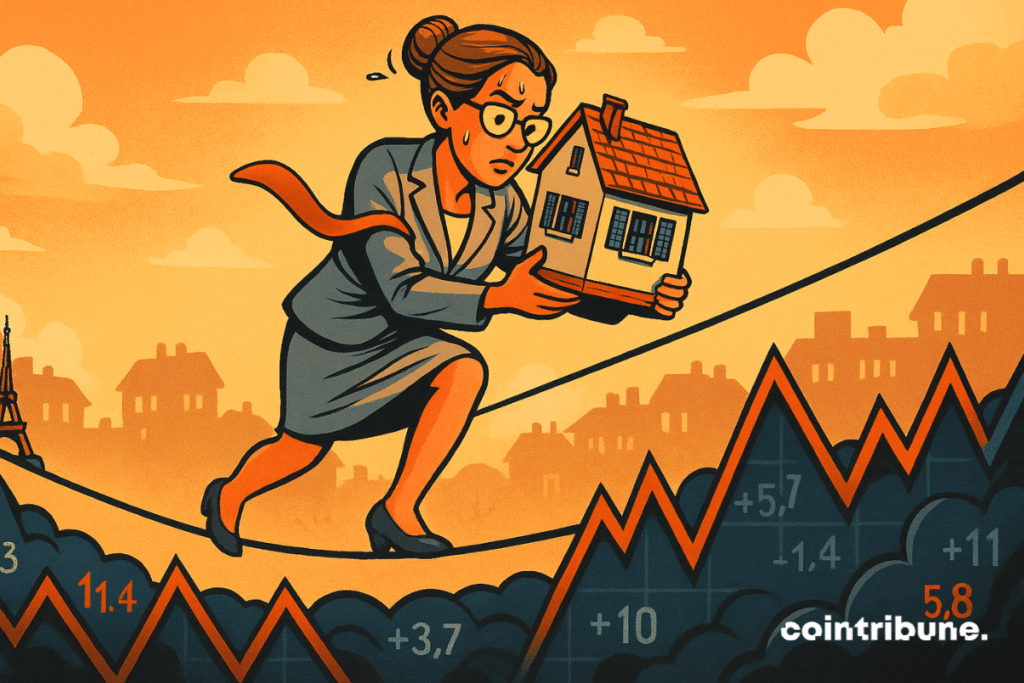Real Estate in France: A Fragile but Confirmed Recovery
After two years of suffocation, the French real estate market is showing measurable signs of recovery. Driven by falling interest rates and price stabilization, the first concrete signals are confirmed by FNAIM figures and field observations reported by Laforêt. Caution is gradually giving way to a recovery, admittedly still fragile but tangible. In an uncertain economic environment, this flicker gives new life to a sector long paralyzed. The question remains whether this momentum can be sustainable.

In brief
- After two and a half years of crisis, the French real estate market is finally showing tangible signs of recovery.
- Sales of old housing increased by 2.5% in one year, with 892,000 notarized deeds recorded by the end of April 2025.
- Demand has increased significantly (+15%), especially among second-time buyers and first-time buyers.
- Despite positive signals, several uncertainties persist: geopolitical context, supply tension, and the future of the MaPrimeRénov’ scheme.
Buyer confidence returns: sales are rising again
Loans are booming again in the real estate sector in France. “The market is regaining color,” celebrated Loïc Cantin, president of the National Federation of Real Estate (FNAIM), during an economic update held on June 18. After two and a half years of crisis, the latest figures reveal a concrete restart of the old residential market.
Sales increased by 2.5% year-on-year at the end of April 2025, representing 892,000 notarized deeds. Although this figure remains below the peak of 1.2 million sales recorded in 2021, FNAIM now forecasts a rebound of 11% by the end of the year, with 940,000 transactions expected in December.
This renewed activity is directly linked to an improvement in financing conditions. In April 2025, the average rate for a mortgage (excluding renegotiations) was 3.13%, down one point over a year and a half.
This trend, coupled with a gradual return of bank offers, has enabled a significant rebound in mortgage lending. The following figures illustrate this:
- €12.6 billion in housing loans were granted in April 2025, compared to €7 billion in January 2024;
- Overall demand has begun to rise again, driven by a return of buyer confidence;
- Households again have improved purchasing power, favoring the relaunch of frozen real estate projects.
All these elements confirm that the recovery is no longer a hypothesis but indeed a cycle taking hold.
A still fragile and segmented market
The increase in transaction volumes is not accompanied by a return to the price surge seen before 2022. On the contrary, “the rate of increase in property prices matches that of inflation”, emphasized Loïc Cantin.
Year-on-year, prices for older properties show a moderate decrease of 0.6%, compared to a 3.2% decline in 2024. While this stability is seen as a sign of market maturity, local situations remain highly contrasted: Nantes (-13%), Lyon (-12%), and Bordeaux (-8%) have seen their values drop significantly over three years.
On the demand side, signals are encouraging but heterogeneous. Overall demand increased by 15% year-on-year, mainly driven by second-time buyers (50% of transactions), followed by first-time buyers (33%) and investors (17%).
However, professionals warn of another potential imbalance. While buyers are back, sellers are becoming more demanding. Indeed, the share of properties sold after negotiation dropped from 91% to 86% in one year and could fall to 75% by the end of this year.
Alongside these traditional dynamics, another trend is quietly emerging: the introduction of cryptos, notably bitcoin, in real estate transactions. Although this practice remains marginal in France, some investors, especially international ones, now favor the purchase of properties through these assets converted into euros.
This approach is particularly appealing in regions with high tourist attractiveness or favorable tax systems, where crypto buyers, often young and mobile, seek to diversify their assets. For innovative agencies, this represents a new buyer profile to target.
These adjustments, although healthy, also reflect a form of latent instability fueled by several uncertainty factors. Among them, the partial suspension of the MaPrimeRénov’ scheme raises questions about the renovation momentum of the old housing stock, while geopolitical tensions and the political environment can quickly curb the momentum observed in recent months. If the current trajectory is confirmed, the market may move toward a new balance, but it is too early to declare victory.
Maximize your Cointribune experience with our "Read to Earn" program! For every article you read, earn points and access exclusive rewards. Sign up now and start earning benefits.
Diplômé de Sciences Po Toulouse et titulaire d'une certification consultant blockchain délivrée par Alyra, j'ai rejoint l'aventure Cointribune en 2019. Convaincu du potentiel de la blockchain pour transformer de nombreux secteurs de l'économie, j'ai pris l'engagement de sensibiliser et d'informer le grand public sur cet écosystème en constante évolution. Mon objectif est de permettre à chacun de mieux comprendre la blockchain et de saisir les opportunités qu'elle offre. Je m'efforce chaque jour de fournir une analyse objective de l'actualité, de décrypter les tendances du marché, de relayer les dernières innovations technologiques et de mettre en perspective les enjeux économiques et sociétaux de cette révolution en marche.
The views, thoughts, and opinions expressed in this article belong solely to the author, and should not be taken as investment advice. Do your own research before taking any investment decisions.